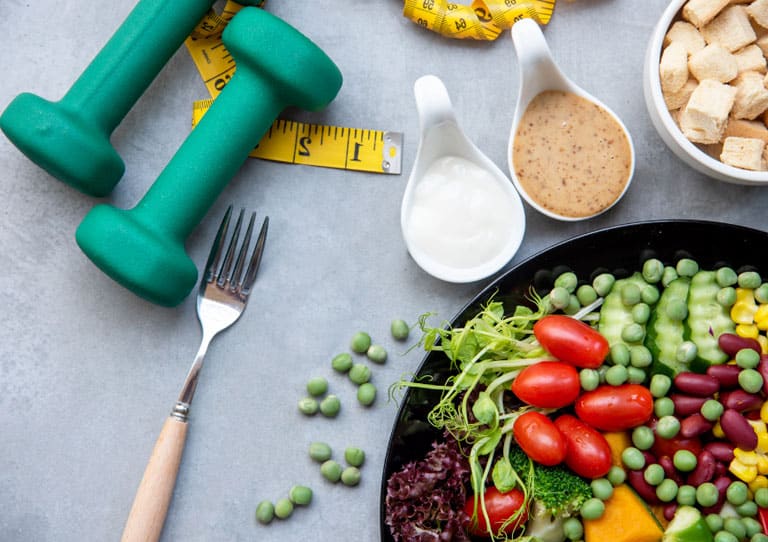
Introduction
Making a lifestyle change, especially one that turns your food choices on its head, like transitioning to a plant-based diet, can be daunting. Suppose you want to reach a weight loss goal with all the essential nutrients and help of this nutrient-dense vegan diet. In that case, all it takes is effective planning and dedication – two vital ingredients of success when making any dietary shift. With the proper guidance, you’ll discover that transitioning to a plant-based diet for weight loss isn’t only possible and enjoyable! In this post, we will provide helpful tips and information about creating an easy transition so you can feel the positive benefits of going green in no time.
Tips for Successfully Transitioning to a Plant-based Diet
Transitioning to a plant-based diet can be an effective strategy for weight loss. Here are seven tips to help you successfully transition to a plant-based diet for weight loss:
- Educate Yourself:
Transitioning to a plant-based diet for weight loss can be challenging and overwhelming, but proper education and preparation can become an attainable goal. One crucial tip is slowly integrating more plant-based foods into your diet while reducing animal product consumption. It is also essential to ensure you get enough protein through sources such as legumes, tofu, tempeh, quinoa, and other whole grains. Additionally, incorporating a variety of fruits and vegetables can provide essential vitamins and micronutrients needed for optimal health while supporting weight loss efforts. Planning meals and seeking new and exciting plant-based recipes can help keep things interesting and prevent boredom in your diet choices. Educating oneself on the benefits of a plant-based diet can motivate successfully transitioning to this lifestyle change for weight loss goals. - Gradual Transition:
A gradual transition is an anticipated and perfect way of transitioning to a plant-based diet for weight loss. Making dietary choices daily takes immense willpower and dedication but can be overwhelming, so starting with small steps is effective. One tip for a successful transition includes incorporating vegan meals into your regular meal plan. This helps make the gradual shift by trying different plant-based options like vegetables, fruits, nuts, legumes, and grains while enjoying regular meals. It’s also essential to research how to balance macronutrients from these foods so that they can fulfil their required energy needs while also losing weight healthily. Another important consideration includes replacing some unhealthy snacks with healthy ones, such as fruit pieces or carrot sticks dipped in hummus. Finally, staying positive and focused on the ultimate goal: leading a healthier lifestyle by eating good foods that nourish the body and achieve long-term wellness rewards is crucial. - Focus on Whole Foods:
Transitioning to a plant-based diet can be challenging, but focusing on whole foods can make weight loss more accessible and successful. Whole foods, such as fruits, vegetables, whole grains, beans and legumes, nuts and seeds, are rich in fibre and other essential nutrients that will keep you full and satisfied while promoting weight loss. When transitioning to a plant-based diet, it’s important to plan meals ahead of time and incorporate a variety of foods to ensure an adequate intake of all essential nutrients. It can also be helpful to gradually increase the number of plants in your diet rather than making drastic changes all at once. Additionally, considering the source and purity of your food is essential for overall health and sustainable environmental practices. By prioritising whole foods in your transition to a plant-based diet, you will reap the benefits of weight loss while promoting overall health and well-being. - Monitor Portion Sizes:
Transitioning to a plant-based diet for weight loss requires careful monitoring of portion sizes. While consuming more fruits, vegetables, legumes, and whole grains can provide high amounts of nutrients, overeating can sabotage weight-loss goals. Establishing healthy eating habits through mindful consumption involves utilising smaller plates and bowls to manage portions. Additionally, prioritising non-starchy vegetables as the foundation for meals and limiting processed foods can also aid in reducing calorie intake without sacrificing satiety. Keeping parts in check by measuring ingredients or using visual cues such as hand proportions can help regulate caloric intake while allowing for variety in meals. Successful transitioning to a plant-based diet for weight loss necessitates patience and persistence but ultimately leads to improved health outcomes and sustainable weight management. - Include Protein-Rich Foods:
Successfully transitioning to a plant-based diet for weight loss requires incorporating protein-rich foods. Consuming adequate amounts of plant-based proteins, such as legumes, nuts, seeds, and tofu, is essential to reach the recommended daily intake and maintain optimal health. One tip is experimenting with different protein sources and recipes to find the best. Additionally, combining complementary proteins can increase the overall protein quality of plant-based meals. It’s also important to pay attention to other nutrients that may become deficient in a plant-based diet, such as vitamin B12 and iron. Including fortified foods or taking supplements can help meet these nutrient needs. With careful planning and consideration, transitioning to a plant-based diet for weight loss can be successful while ensuring proper nutrition. - Stay Hydrated:
Successfully transitioning to a plant-based diet for weight loss requires careful attention to hydration. Plant-based diets, being naturally low in calories and high in fibre, help promote weight loss but can also cause dehydration. Including plenty of water-rich fruits and vegetables in your diet, such as cucumbers, tomatoes, melons, and berries, is essential. Additionally, herbal teas and coconut water are excellent sources of hydration without added sugar or artificial sweeteners. If you exercise regularly or live in a hot climate, it is crucial to increase your fluid intake to compensate for sweat loss. To ensure optimal hydration and successful weight loss on a plant-based diet, aim for at least eight cups of water per day or more, if needed, based on activity level and environment. - Seek Variety and Flavor:
Successfully transitioning to a plant-based diet for weight loss requires seeking variety and flavour in your meals. Incorporating different types of fruits, vegetables, beans, whole grains, nuts, and seeds into your diet can provide essential nutrients while keeping you satisfied. Experimenting with herbs and spices can also enhance the flavours of your dishes without adding excessive amounts of salt, sugar or fat. Preparing meals at home using fresh ingredients allows greater portion size and nutrient content control. While it is essential to focus on nutrient-dense foods, incorporating occasional treats or vegan substitutions for favourite comfort foods can help maintain long-term adherence to a plant-based lifestyle. It is also recommended to consult with a healthcare professional or registered dietitian to ensure your plant-based diet is balanced and meets your dietary needs.
Remember, it’s essential to consult with a healthcare professional or registered dietitian before making any significant dietary changes, especially if you have any pre-existing health conditions. They can provide personalised advice and ensure you meet your nutritional needs while achieving your weight loss goals.

FAQs
How do I ensure I’m getting enough protein on a plant-based diet?
Ensuring adequate protein intake on a plant-based diet is essential for optimal health. Plant-based protein sources include legumes, nuts, seeds, whole grains, and vegetables. It is recommended to consume various sources to ensure a complete amino acid profile. Additionally, incorporating protein-rich snacks such as hummus with veggies or roasted chickpeas can boost daily intake. Protein powders made from peas, rice, hemp or soy are also an effective way to supplement the diet if necessary. However, it’s important to note that research suggests that most people consuming sufficient calories from various plant foods will naturally achieve their recommended protein requirements without supplementation. Calculating protein needs for a healthy diet based on body weight and activity level with the guidance of a registered dietician can also help ensure adequate daily intake on a plant-based diet.
What are some of the best plant-based sources of protein?
Numerous plant-based protein sources provide the body with essential amino acids and nutrients without consuming animal-based dairy products. Some of the best plant-based protein sources include quinoa, lentils, chickpeas, tofu, almonds, chia seeds, hemp seeds, spirulina, and tempeh. Quinoa packs an impressive 8 grams of protein per cup and contains high fibre and iron. Lentils are another excellent source of plant protein, with 18 grams per cooked cup and plenty of folate and manganese. Chickpeas contain over 14 grams of protein per cooked cup, ample dietary fibre, and various vitamins and minerals.
Meanwhile, tofu is a healthy food versatile addition to many meals, providing up to 20 grams of protein in a single serving and calcium. Nuts such as almonds can be eaten as a snack or added to recipes high in fibre throughout the day while providing beneficial proteins for muscle growth. With these options and more available for those seeking plant-based alternatives, including superfood supplements like spirulina, there is no shortage of conscious consumers who wish to eat meat and add more natural nutrition to their diet without sacrificing quality or taste.
What are some tips for staying motivated while transitioning to a plant-based diet?
Transitioning to a plant-based diet can be challenging, but staying motivated is crucial for success. Firstly, educating oneself on the benefits of a plant-based diet is essential. This includes the health benefits for oneself and the positive impact a food diet has on the environment and animal welfare. Secondly, finding inspiration from others who have successfully transitioned to a plant-based diet can help you stay motivated. Finding support groups or engaging with social media influencers in the vegan community can encourage. Thirdly, experimenting with new recipes and ingredients can keep meals exciting and prevent boredom from traditional meat-based diets. Finally, it’s essential to approach this transition with patience and allow oneself time to adjust gradually rather than expecting an immediate change overnight. Celebrate small victories as progress should be noticed and maximised.
Conclusion
Transitioning to a plant-based diet is an excellent way to lose and maintain a healthy weight. With the right plan and dedication, you can reach your target weight quickly. While making this transition, it’s essential to put yourself first, be mindful of what you put into your body, and listen to your body’s needs. Additionally, take the time to experiment with different recipes, be creative with the ingredients, and utilise meal prepping for success! Finally, find a support system for yourself that understands your journey—write down goals and share them with a friend or family member who can motivate you along the way. All these steps will help achieve healthy eating habits and make weight loss more achievable.